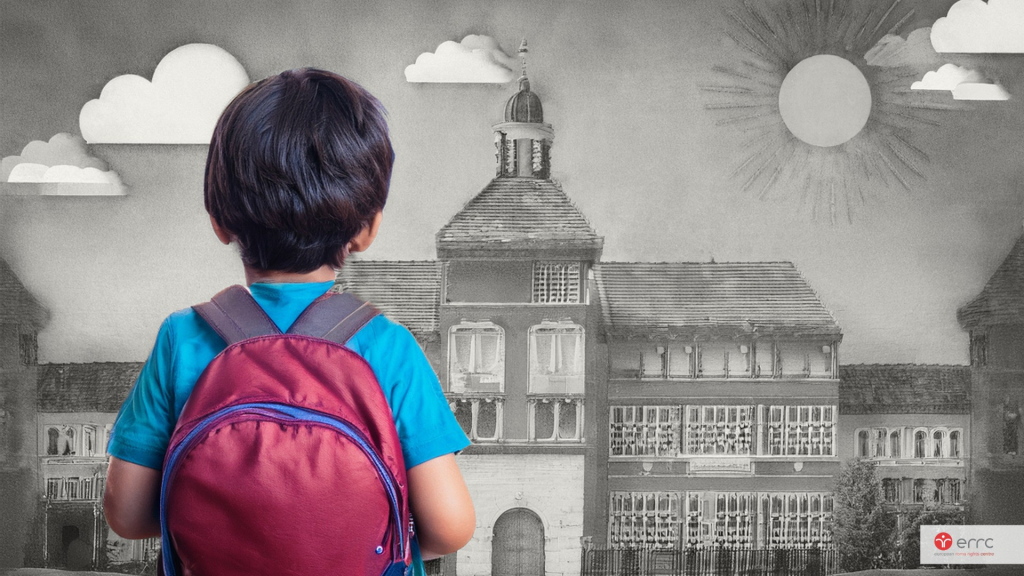Slovakia: Romani Children Face Entrenched Discrimination As School Segregation Persists
16 April 2025

Bratislava, Brussels 16 April 2025: Ten years after the EU launched an infringement procedure against Slovakia for breaching the EU Race Equality Directive, Romani children still face entrenched discrimination in education. In a new report released today, Amnesty International and the European Roma Rights Centre (ERRC), condemn the “widespread and growing racial division in education”, and call on the Slovak government to take urgent and systemic action to end segregation in its schools.
The briefing report, Separate & Unequal: School Segregation Persists for Roma in Slovakia, takes stock of legislative and policy responses following the European Commission’s referral of Slovakia to the European Court of Justice (ECJ) in April 2023 but finds these measures insufficient to address systemic practices of segregation. Legislative reforms, including amendments to the School Act, lack the enforceability and clarity needed to address entrenched disparities.
“Even though ten years have passed already since the infringement proceedings were initiated against Slovakia by the European Commission, we do not such see much of a change in segregation practices,” said the ERRC’s Legal Consultant, Michal Zálešák.
“The main reason is that the Slovak Government spent several years denying this was a systemic problem. While the willingness of the incumbent minister to take steps towards eradicating segregation is positive, we are concerned that most of the legislative changes adopted are not sufficiently effective to bring the desired change.”
“Our findings clearly show that we are not dealing here with accidental inequality. What we are witnessing, year after year, is a gradual attempt to legitimize a two-tiered education system—one for children born with full access to their right to education, and another for those burdened from the start with segregated, low-quality schooling,” said Rado Sloboda, Director of Amnesty International.
“This widespread segregation will not be undone by half-measures, symbolic reforms, or pilot projects. What’s needed is comprehensive and robust reform, targeted investment, and enforcement mechanisms that ensure real accountability.”
Severe disparities in educational outcomes persist, including significantly higher-grade repetition, lower standardised test scores, and elevated dropout rates compared to non-segregated schools. So-called “Roma schools” are disproportionately under-resourced, lacking basic facilities such as gyms and playgrounds. The report also confirmed the negative impact of two-shift schooling—a system almost exclusively applied to Romani children—which further limits their access to quality education. At the same time, funding and resources still flow to schools that continue to deliberately segregate and exclude.
Despite judicial rulings and repeated recommendations from European and international human rights bodies, segregation persists as a deeply rooted issue in Slovakia’s education system. A full decade has passed since the European Commission first launched infringement proceedings against Slovakia in April 2015, for its breach of EU rules on racial equality, which ‘strictly prohibit’ discrimination on grounds of ethnic origin.
In April 2023, the European Commission decided to refer Slovakia to the Court of Justice of the European Union for ‘failing to effectively tackle the issue of ethnic segregation of Romani children in schools.’ It noted that segregation had in fact increased since 2016, and that Slovakia was the EU Member State with the highest share of Roma segregation in education.
Ten years after the EU infringement the new report confirms that Slovakia’s education system persists in denying Romani children access to quality integrated education, and reveals how segregation is perpetuated by inadequate monitoring, infrastructural and academic inequities, and discriminatory practices. The report stresses the need for the European Commission to continue closely monitoring Slovakia’s compliance with the Race Equality Directive, and to take further enforcement actions where necessary.
At a national level, the report calls for bold, systemic reforms that go beyond symbolic legislation, robust monitoring, the allocation of targeted resources, and an explicit political commitment from the Slovak authorities to bring a final end to racial segregation.
Separate can never be equal. Slovakia must act now to end this abuse of fundamental rights, which not only denies Romani children the opportunities to succeed but ensnares future generations in poverty and social exclusion.
This press release is also available in Slovak.
The report ‘Separate & Unequal: School Segregation Persists for Roma in Slovakia’ can be downloaded here in English and Slovak.
For more information, or to arrange an interview contact:
Jonathan Lee
European Roma Rights Centre
jonathan.lee@errc.org
+32 49 288 7679
Daniela Mužíková
Amnesty International Slovakia
daniela.muzikova@amnesty.sk
+34 645 4171 85




